Israel's 'Prince Of Torah' Confronts Coronavirus
As Israel entered coronavirus lockdown in March, a video emerged showing one of the world's most powerful rabbis, flanked by his grandson, professing ignorance about Covid-19 and insisting religious schools remain open.
The rabbi was 92-year-old Chaim Kanievsky, whose knowledge of Jewish law is so revered that his rulings are thought to require total compliance within his community.
To some followers, including tens of thousands of the Lithuanian branch of ultra-Orthodox Jews, Kanievsky is known as "our master, the Prince of Torah".
The video cast Kanievsky, along with his 30-year-old grandson and top advisor Yaakov Kanievsky, as central figures in a debate that has consumed Israel throughout the pandemic.
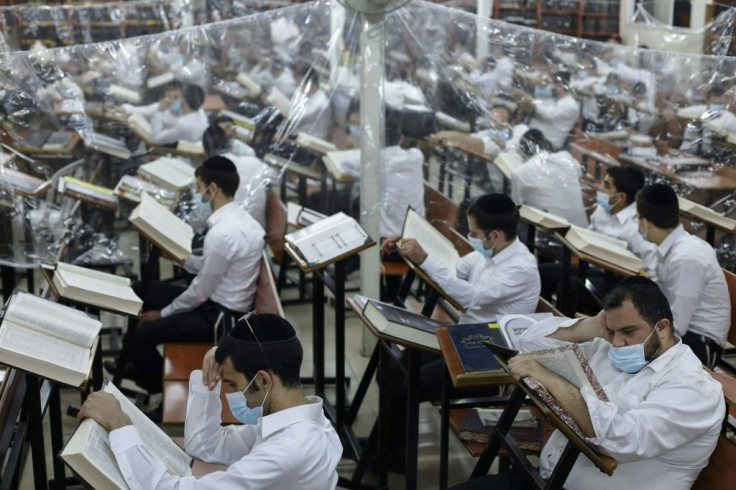
For many secular Israelis the refusal of ultra-Orthodox Jews, or haredim, to respect government-mandated safety measures like school closures undermined the national pandemic response.
In the March video -- plus comments that became public as Israel was exiting its second lockdown last month -- Kanievsky appeared to openly defy school closure orders.
A column in the Jerusalem Post described the rabbi's conduct as an "extremely dangerous" act of "civil disobedience" unprecedented in Israel's history.
Other media outlets and experts questioned how an unelected religious leader had acquired enough power to defy mandatory safety orders seemingly without consequence.
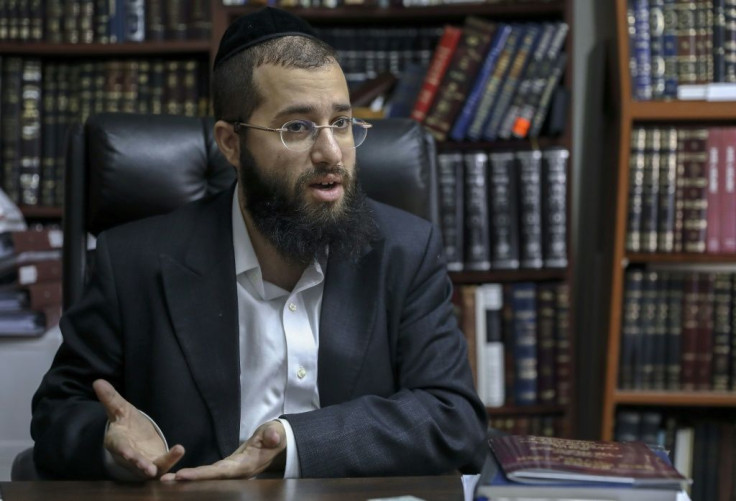
In a rare interview in the rabbi's modest flat in the largely haredi city of Bnei Brak, Yaakov Kanievsky told AFP that his grandfather's conduct during the pandemic had been grossly misunderstood.
"Nobody here is crazy," Kanievsky said, noting that the rabbi had himself contracted Covid-19 several weeks ago, but had recovered. "Everyone understands (the risk)."
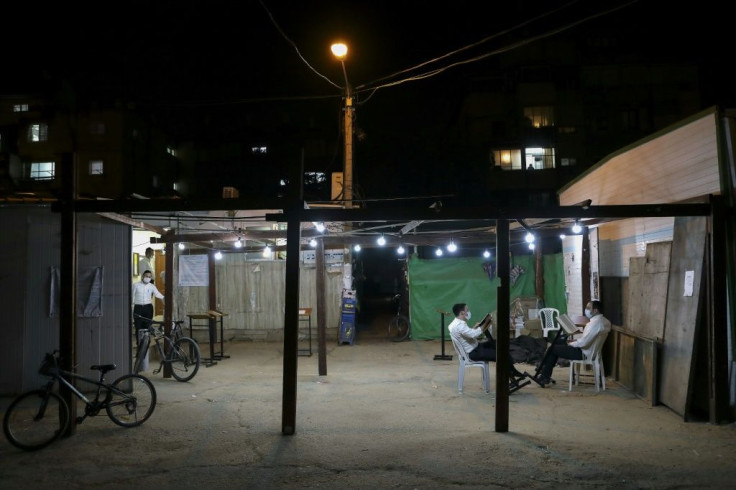
In a cramped study lined with religious texts -- with two phones buzzing incessantly on his desk -- Kanievsky explained that the video which triggered the initial uproar "wasn't supposed to become public."
"The rabbi did not for one minute want to appear as though he was being defiant or combative," he said.
Kanievsky listed the difficult choices his grandfather had backed to protect his community.
They include closures of synagogues and ritual baths, and authorising phone use on Shabbat, Judaism's day of rest, to convey urgent health information.
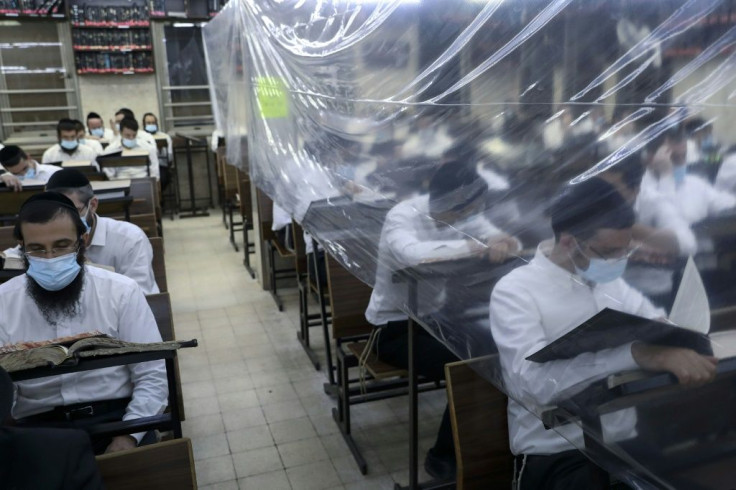
But Kanievsky also said that secular Israelis needed to understand that, for his grandfather, the closure of religious schools, or yeshivas, was a red line.
"For the rabbi, the most important thing in the world is the study of Torah. Without that, there is no point to anything," he said.
"The rabbi believes that the Jewish people have no existence without Torah. You can't separate the two, you must study."
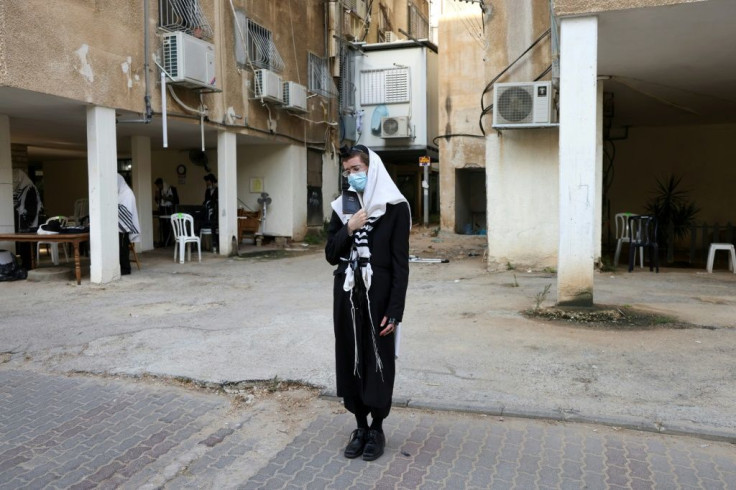
Israel's haredi groups have responded to the pandemic differently, according to experts.
One group, the Sephardim, largely observed health ministry guidelines.
Contrasting them are the Hassidim, a fractured movement that originated in Eastern Europe.
According to Hebrew University professor Benjamin Brown, the Hassidic attitude to coronavirus restrictions can be summarised as "sheer and total disobedience."
Some Hassidic Jews have reportedly shouted "Nazi" at security officers trying to enforce public health restrictions.
Chaim Kanievsky, born in the Belarussian city of Pinsk, is the de facto head of the Lithuanian group of haredis, and is a "very powerful" figure in the society, Brown said.
Kanievsky's refusal to accept government restrictions worried some who saw a religious leader operating beyond the government's reach, Brown added.
Gilad Malach, an ultra-Orthodox expert at the Israel Democracy Institute think-tank, said some observers question whether the elderly rabbi "is really aware" of the criticism he has faced.
Some believe that his grandson "is controlling the situation" as a gatekeeper to the wider world, Malach said.
His powerful position was reinforced by a call this week with Prime Minister Benjamin Netanyahu to discuss the safe re-opening of religious schools.
Yaakov Kanievsky conceded that infection rates are higher among haredim, but said it was primarily because they have small homes and many children, fuelling transmission within families.
Remote study is also hard for haredi pupils who don't use smartphones and tablets.
He also said there were differences between the Lithuanian group and some other Hassidim, describing the latter as including "coronavirus deniers."
Kanievsky said that those who accused his grandfather of ignoring health advice did not understand that, for the rabbi, "the sanctity of life" was paramount.
He argued that the national conversation around coronavirus was ultimately one that centres on selecting priorities.
For some Israelis, policies to keep gyms, restaurants or shops open are the most important.
"We say children need to continue learning Torah," Kanievsky added. "Torah study is the most important."
© Copyright AFP 2024. All rights reserved.





















